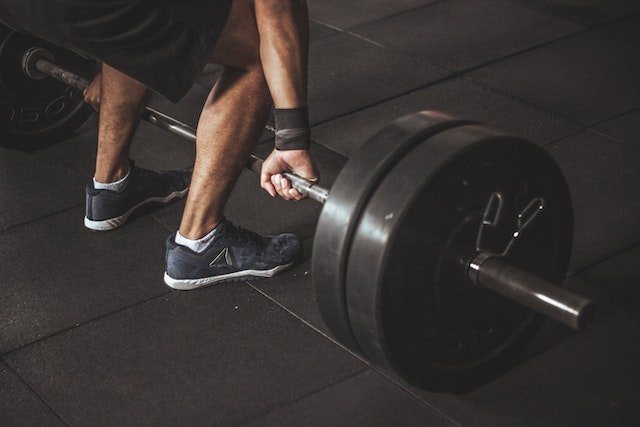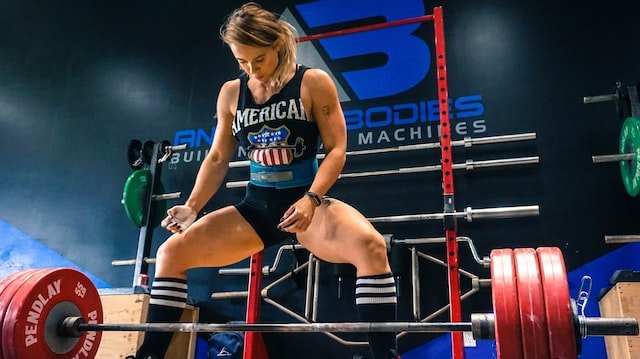
Why Am I So Tired After Deadlifts? Everything You Need To Know
Do you ever finish a heavy deadlift set and feel like you can’t move? You’re not the only one, this exercise takes no prisoners and can be very demanding on your mind and body.
Contrary to popular belief, deadlifting doesn’t only work your back and legs – it’s a full-body exercise that taxes your entire system.
However, if you are aware of ways to mitigate the fatigue, you may be able to help reduce the feeling of exhaustion after deadlifts.
Here’s why you might feel so tired after deadlifts, and what you can do to recover more quickly.
Why Am I So Tired After Deadlifts?
One thing to remember is that deadlifts are a compound movement that requires a lot of energy and mental focus. As such, they can be more mentally draining than other lifts. Additionally, you might be lifting too heavy or doing too much volume for your body to handle. If you’re pushing yourself to failure every set, it could also lead to intense fatigue afterwards. You’ll need to assess your current strength level and make sure you are lifting weights that are challenging, but not too difficult. Also, make sure you’re breathing correctly throughout the lift. If you hold your breath during a deadlift set, it can lead to orthostatic hypotension – a drop in blood pressure when standing up – which can cause extreme exhaustion. Staying hydrated and fuelling your workouts is also important. If you don’t have enough energy reserves in your body, it can lead to fatigue after heavy lifts like deadlifts. Finally, make sure you’re allowing enough rest time between sets so that your muscles and CNS have a chance to recover. Rest is crucial for performance and proper recovery. In short, deadlifts can be very exhausting if you don’t approach them with the right technique, volume and intensity. However, if you take care to follow good form, lift appropriate weight and rest between sets, you may find that your fatigue levels are much lower after each workout.
Compound movement
One thing you have to consider when thinking about why you are so tired after deadlifts is that it is a compound movement, which involves multiple muscles and joints, and requires a lot of energy to complete.
The muscles involved in a deadlift are the glutes, hamstrings, lats, traps, core and upper back. So it’s not just your legs doing all the work – your entire body is working together as a unit to complete each rep.
This means you are going to be exerting a lot of energy and your body will need time to recover after each set. Not only that, but you will find that your body will yearn for rest and recovery more quickly on a deadlifting day than when you train other lifts.
Make sure you listen to your body if it’s trying to tell you something, especially after deadlift day.
Therefore, it’s important to make sure you are giving yourself enough rest between workouts, and that you are not pushing yourself too hard or beyond your limits.
Make sure that you use proper form and technique to avoid injury or putting too much strain on any one muscle group, which can lead to fatigue.
Lifting Too Heavy or Doing Too Much Volume
Are you tired after your deadlifts? You might be lifting too much weight or doing too much volume for your body to handle.
It’s important to assess your current strength level and make sure you are lifting weights that are challenging, but not too difficult.
If you are pushing yourself too hard in every set, it could lead to fatigue later on in your workout or the next day. Additionally, if you’re adding too many sets and reps per workout, it could also be contributing to your exhaustion.
The general consensus when doing heavy compound lifts, such as deadlifts would be to keep sets and reps low, as this will help you build strength quicker, while also allowing your body to recover more quickly.
If you are going lighter, then it’s okay to increase the rep range, but make sure you’re not overdoing it.
Obviously, if you are lifting a weight that’s realistically too heavy for you, it’s going to be extremely taxing on your body, which can lead to fatigue after the workout.
Going too heavy may compromise your form and with that, your safety. So make sure you know what weight you should be lifting, and that it’s not too heavy for you.
Are they new?
If deadlifts are new to you, then it could be that you are just not used to the intensity and strain of the lift.
If so, it’s important to start off slowly and build up your strength gradually, as this will help you to learn proper form and technique before increasing the weight.
It’s inevitable that you will experience a case of DOMS (delayed onset muscle soreness) the day after deadlift day, so make sure your body is used to the intensity before you start going too heavy or too hard too soon.
Spend time perfecting your form and getting used to the lift before adding more weight. This will also help you to prevent injury and fatigue caused by incorrect form or too much weight.
If you’re new to lifting, it’s totally normal to want to do it as often as possible. This is actually a great sign that you’ve got the “fitness bug”.
Just make sure that you don’t overdo it and that you are giving your body the rest and recovery it needs to perform at its best. However, this will come with experience and time.

Are you going to failure?
If you’re pushing yourself to failure on every set, it could be the cause of your fatigue.
Going to failure can have its benefits, like pushing you to your limits and helping you build strength, however it can also be detrimental if done too often.
Repeatedly pushing yourself to failure can lead to overtraining, mental and physical fatigue, and eventually injury if you do not give your body the rest it needs afterward.
If you’re not seeing results from your current workout routine, change it up by leaving one rep in the tank for each set. You will also need to have a de-load phase in your routine, where you will decrease the weights and volume to give your body time to rest and recover.
Doing this will help prevent any potential injuries from pushing yourself too hard all the time.
If you’re going to failure, it’s important that you are taking time to recover afterward. Give yourself enough rest between workouts, and be mindful of how you’re feeling during your lifts.
Demanding on CNS
If you didn’t know by now, exercises like squats and deadlifts are very demanding on your central nervous system (CNS) and entire body. You are using a lot of muscles to get the movement done, so it’s going to take a lot of energy and focus.
The reason deadlifts are so taxing on your CNS is that you have to use multiple muscle groups, as well as time your breathing correctly for the duration of the lift. This can be very draining on your energy levels.
If you are feeling fatigued after deadlifts, then it’s likely because your body is telling you to slow down and give yourself time to recover.
Make sure you’re taking adequate rest days between workouts, and listen to your body when it’s telling you that it needs a break.
The fatigue you’re experiencing could be due to the stress and tension on your body. To help your body recover and relax, try doing some yoga or stretching exercises.
Related: Why do squats feel like cardio?
Are you breathing correctly?
Another factor that could be contributing to your fatigue after deadlifts is if you are holding your breath during the lift. Holding your breath during a deadlift set can lead to orthostatic hypotension or a drop in blood pressure after standing.
It’s essential that you learn how to breathe correctly while doing deadlifts, as this will help you to remain relaxed and in control of the lift.
Make sure that you are taking deep breaths throughout each rep, inhaling and exhaling on the way up and down. If you find yourself struggling to breathe, it might mean that you are pushing yourself too hard or lifting too heavy of a weight.
When we try to lift something heavy, it’s natural to hold our breath for a bit so that our bodies are ready and can handle the load.
However, this can be dangerous if done too often. Make sure that you are breathing correctly and not holding your breath during any exercise, as this can lead to dizziness and fatigue.
Hydration is crucial
Dehydration can also be an issue when it comes to feeling tired after deadlifts. When you are dehydrated, your body does not have enough water to sustain its energy levels.
It’s important to stay hydrated throughout your workouts, as this will help keep your energy levels up. Try to drink water before and during your workout, and make sure that you replenish your body with electrolytes after a strenuous session.
You want to be drinking at least half of your body weight in ounces of water per day. This means that if you weigh 200lbs (90.72kg), then you need to consume 100oz (2.96 litres) of water to stay hydrated.
Standard signs you are dehydrated are headaches, feeling thirsty, dry mouth, and fatigue. If you notice any of these symptoms, try drinking some water or electrolyte beverages to replenish your energy levels.

You must fuel workouts
You also want to make sure that you’re eating enough before your workouts. If you don’t have adequate fuel levels in your body, then your energy levels will be low, and you’re more likely to experience fatigue afterwards.
Eat a meal with a good balance of carbohydrates, fats, and proteins to give you sustained energy throughout your workouts. This will help keep your body fuelled and prevent fatigue after deadlifts.
You have to be very careful if you are doing heavy lifting and you are trying to lose weight, because if you don’t have enough fuel in your body, then your performance will suffer.
Make sure that you are taking in enough calories and nutrients to sustain your workout, but at the same time, don’t over-consume either.
Some examples of good pre-workout snacks are a banana, oatmeal and fruit smoothie, or a handful of nuts.
Post-workout snacks can include protein shakes and bars, or Greek yoghurt with fruit.
However, we all have different meal preferences and calorie needs, so do what works best for you and your body.
Frequency
You also want to make sure that you are not overtraining and working out too often. If you are, then this can lead to intense fatigue afterwards.
Deadlifts are a great exercise, but they are also very taxing on the body and require rest days in between workouts to allow your muscles to recover.
Make sure you are taking at least one full rest day in between deadlift sessions, and that you are not overloading your body with too much volume or intensity.
It’s ok to do lighter sessions after your deadlift workout, but make sure it is light by using a weight around 50% of your one rep max.
Take time to plan your workout routine in such a way that you are allowing your body to rest and recover before hitting the deadlifts again.
Related: Why do my forearms hurt when I deadlift?
Mentally draining
Deadlifts are also mentally draining, as they require intense focus and concentration.
If you have a lot going on in your life or if you’re feeling stressed or anxious, this can lead to fatigue after deadlifts.
Make sure that you are taking some time to relax and de-stress before you hit the gym. Listen to some calming music, meditate, or take a walk outside to help clear your mind and get your energy levels up.
It’s important to be in a good mental state before doing any kind of intense exercise like deadlifts so that you can get the most out of your workout.
I find that music helps me stay focused and motivated throughout my workouts, so I always make sure to have some good tunes playing in the background, while also forgetting about the nonsense of the world for a bit.

Rest between sets
If you are not allowing enough rest between sets or taking too long of a break in between, this can be one of the reasons you are feeling tired.
Deadlifts require a lot of energy and taking too long of a break can cause your muscles to cool down and not be as explosive when you start back up.
On the flip side, if you aren’t having enough rest time, this can also lead to fatigue, as you won’t have given your muscles enough time to recover and generate the energy needed for your next set.
Make sure you are taking the necessary rest time that your body needs in between sets so that you can maximize your performance and stay energized.
You want to be taking 1-2 minutes of rest in between sets and using the rest time to focus on your form, check in with your body, and visualize yourself completing the next set.
This will help you stay focused and energised throughout your workout, and you’ll be less likely to feel fatigued afterwards.
Recovery is vital
Recovery is key when it comes to reducing fatigue after deadlifts.
When we are recovering and sleeping, that’s when our bodies are repairing and rebuilding themselves, so make sure that you are getting enough rest.
In addition to getting 7-8 hours of sleep per night, you should also be doing things like stretching and sports massage after your workouts to help reduce muscle soreness.
Make sure you are taking care of your body – you can do this by making sure you are getting enough sleep, eating a balanced diet, and stretching and foam rolling to promote muscle recovery.
If you are able to get adequate rest and nutrition, then your body will be better prepared for the next workout and not feel as tired as it would have otherwise.
It’s also important to remember that everyone is different and some people might need more rest than others. Listen to your body and don’t be afraid to take a few extra rest days if you need them.
Is it just a bad day?
Finally, it’s important to remember that not every workout will be the same. You might have a bad day and just feel more tired than usual after a deadlift workout.
If this is the case, don’t worry about it too much and just focus on getting better for the next workout.
You also don’t want to let the bad session ruin the rest of your day or your next workout, so make sure you leave that negativity behind when you leave the gym and focus on the positive.
If you find yourself consistently feeling tired after deadlifts, then it might be time to assess your current strength level, make sure you are lifting weights that are challenging but not too difficult, and ensure that you’re getting the rest and recovery your body needs.
We all have a lot going on in our day-to-day lives, which means it’s just not possible to smash out amazing workouts every time.
If you are pushing yourself to the limit then it’s okay to have a bad day or feel more tired than usual afterwards. Just make sure that you are taking the necessary steps to ensure your body is getting enough rest and nutrition for future workouts.
Related: Why do I feel hamstring curls in my calves?
Final thoughts…
Deadlifts can be a great full-body exercise if done correctly, but they can also be quite mentally and physically draining.
If you find yourself feeling tired after deadlifts, there could be a few different factors at play.
Make sure that you are taking the necessary rest time, assessing your current strength level, getting adequate rest and nutrition, and listening to your body so that you can avoid fatigue in the future.
Remember, don’t be afraid to take a few extra rest days if you need them and focus on the positive after a tough workout. When you take the necessary steps and listen to your body, you’ll be better prepared for future workouts and have more energy overall.
Do you feel tired after deadlifts? Let me know in the comment section below.


